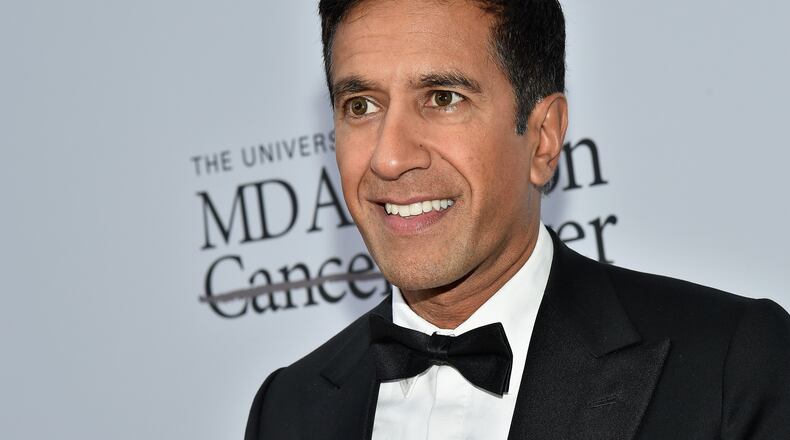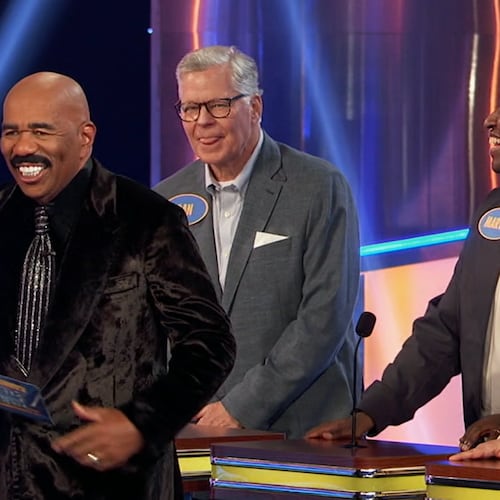Originally posted Wednesday, March 20, 2019 by RODNEY HO/rho@ajc.com on his AJC Radio & TV Talk blog
CNN chief medical correspondent and practicing Atlanta neurosurgeon Sanjay Gupta is a man who lives such a busy life that it makes sense he has two back-to-back projects coming out that address 1) stress and 2) extending life.
“Perhaps ironically, counter-intuitively, working on projects like this is less stressful for me,” said Gupta in a recent interview. “When things are more nebulous and I don’t know what is happening, that’s more stressful.”
The first project coming out March 25 on HBO is a documentary called "One Nation Under Stress." He explores why in recent years working class whites are dying young at greater and greater rates, depressing life expectancy. This is a trend that began in the mid-2010s and has not yet abated.
Americans in the 1960s had some of the longest lifespans on Earth, he noted. Now among developed countries, the United States is scraping bottom.
“Every other developed country has increased life expectancy and decreased mortality except for one: ours,” Gupta said.
The documentary tackles many familiar reasons: a mélange of income inequality, the fraying social fabric, despair, lack of control and dashed expectations.
The recent admissions scandal only amplifies what is going on, he said: “I have three teenage girls and everyone is talking about it. This type of glaring inequality, so in your face, tends to be very stressful for society.”
The documentary opens in Greensburg, Pa. (population: 14,000 or so and shrinking), where the forensic pathologist Cyril Wecht is seen looking over bodies of people who died well before old age. He noted that more than half the bodies he looks at now suffered from drug-related deaths. "It is a significant epidemic of monstrous proportions," he said gravely.
Gupta points out the economic decline of the Rust Belt, where much of the health declines have occurred.
He visits Pennsylvania factory workers who just lost their jobs after their plant shut down. He visits his small hometown in Michigan, where he grew up as the only Indian child in a school full of white working class children. A best friend of his said all the uncertainty surrounding his future creates inordinate amounts of stress.
Gupta realized that while he lives with stress in his busy life, he has at least a modicum of control over his life given he’s in the medical field and a journalist with cache.
He also wondered why blacks continue to see improvements in life expectancy, though they still live 3.5 years less than whites.
“For African-Americans, it’s a chronic state of stress,” explained his colleague Charles E. Moore, chief of surgery of otolaryngology at Grady Memorial Hospital. “For a certain white population, it’s a new issue and possibly that’s what’s causing that decline. The white working class has not seen that systematic type of oppression.” He noted a 12-year life expectancy gap between the poorest and richest zip codes in Atlanta.
Interestingly, the health of rich folks in countries with increasing inequality are worse as well than those where there’s more equity. “The greater the inequality, the lower the levels of trust, of social cohesion, the higher the levels of social isolation,” said Michael Marmot, a professor at University College London who did a study on that topic. And isolation is a major factor in early deaths.
While the documentary provides a few hopeful anecdotes, it doesn’t offer any easy solutions.
“It’s in some way a biopic of what’s happening in America at this time,” Gupta said, “from a public health and an existential standpoint. We spend nearly $4 trillion a year on health care and we’ve gone backwards!”
On the flip side, Gupta’s latest CNN series “Chasing Life,” which debuts Saturday, April 13 at 9 p.m., takes him to six foreign countries where he looks at how subcultures are able to live longer.
“I recognize people in the United States and its medical system are very provincial about our health care,” Gupta said. “If it’s not made in America, it can’t possibly work.”
That’s not true. He visited six countries - including India, Japan and Bolivia, where he ended up visiting an indigenous tribe that has no signs of heart disease, dementia or diabetes. Their life expectancy isn’t higher because they tend to die of trauma such as snake bites or childbirth. But they usually live quality lives until the very end.
Indeed, he heard this line in Japan: “You want to live your life like an incandescent light. Shine brightly, then go out. You do not want to go like a fluorescent light with a lot of flickering and steady dimming.”
He taped "Chasing Life" before CNN's Anthony Bourdain took his own life last spring. He was able to tap the Emmy-winning Bourdain's expertise in travelogue work.
“He was very generous with me,” Gupta said. “He set the standard, no question. He told me to always allow myself to be surprised. What Tony was so good at was truly immersing himself in these places and you can sense it.”
The Bolivia Amazon episode, Gupta said, was the wildest one. "We flew into this little town and took a four-by-four into a rain forest. Then we got into a dug-out canoe and spent hours on these rivers until we found the Tsimane tribe. And the language is not like any other. We had to do a three-way translation. It was really complicated."
He did kind of enjoy being off the grid for two weeks. “I used a pen and paper,” he said. “I didn’t bring my laptop. It was too wet for electronics. I really loved it.”
TV PREVIEW
“One Nation Under Stress,” 8 p.m. Monday, March 25, HBO
“Chasing Life with Dr. Sanjay Gupta,” debuting 9 p.m. Saturday, April 13, CNN
About the Author
Keep Reading
The Latest
Featured




